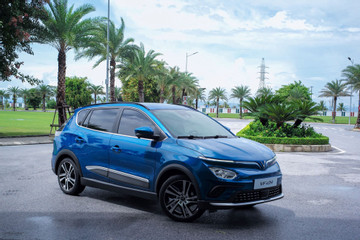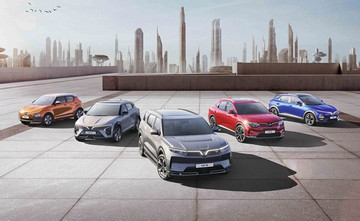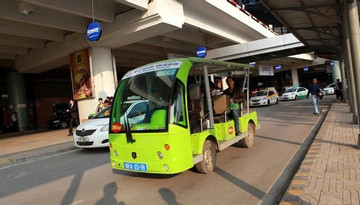- © Copyright of Vietnamnet Global.
- Tel: 024 3772 7988 Fax: (024) 37722734
- Email: evnn@vietnamnet.vn
electrical vehicles
Update news electrical vehicles
Vietnam shows a strong determination to shift towards EVs
Vietnam is highly committed to transforming towards green practices across various industries, including the car industry.
Vietnam urgently needs standards for electric and hybrid vehicle emissions
There is currently no national standard for emissions for electric and hybrid vehicles in Vietnam, which has hindered many manufacturers from producing or importing these vehicles.
Hanoi to go green with electric buses by 2035
Between 2026 and 2030, Hanoi aims for a mix of electric buses (50 per cent_ and buses powered by cleaner burning fuels like liquefied natural gas (LNG) or compressed natural gas (CNG) (50 per cent).
Developing EV charging stations crucial for promoting green transport: Insiders
Developing charging stations for electric vehicles (EV) is an important part of the country’s scheme to promote the use of EVs in Vietnam to build a green transport system, according to insiders.
Hanoi should shift to all electric buses by 2030: expert
This chair of the Vietnam Clean Air Network, Hoang Duong Tung, has praised Hanoi’s plan to spend VND43 trillion to develop green buses.
Significant progress for EV development in Vietnam
The development of electric vehicles in the Vietnamese market has shown significant progress in recent years.
Electric car market: Abundance of options, infrastructure shortfall
Besides VinFast's electric cars, foreign electric vehicle manufacturers have recently announced plans to introduce multiple models in Vietnam, with various price ranges.
Over 30% of Vietnamese consumers are interested in EVs: report
More than 30% of Vietnamese consumers are interested in purchasing electric vehicles (EVs), according to a recent Deloitte’s global automotive consumer study.
Vietnam to need US$12 billion for EV infrastructure by 2040 - HSBC
Vietnam will need an estimated US$12.3 billion by 2040 to develop its electric vehicle (EV) infrastructure to keep up with a projected 2.5-fold increase in EV sales over the next decade, HSBC said in a recent report.
VN sees great potential for development of electric motorbikes
The potential for developing the electric motorbike market in Vietnam is significant.
Can Vietnam attract investment in EV manufacturing?
Reuters has quoted its source from Phu Ha Industrial Zone(IZ) in Phu Tho province as reporting that BYD, the large automobile manufacturer from China, has postponed its plan to build an EV (electric vehicle) factory in Vietnam.
Vietnam targets all transport means run on green energy by 2050
Vietnam aims to bring net greenhouse gas emissions to zero by 2050, so ideally all means of transport will use green energy. For the country, green transportation was also an urgent requirement to build green and smart cities, experts have said.
Vietnam's EV market forecast to boom this year
Vietnam is experiencing a strong shift towards electric vehicles (EVs).
HCMC to implement pilot plan using electric vehicles in tourism
The HCMC Department of Transport has just proposed the municipal People's Committee implement a pilot program to use four-wheeled electric vehicles for tourism in the city.
Hanoi to pilot electric buses on nine routes
The Department of Transport of Hanoi has proposed to the municipal People's Committee to allow the pilot use of electric buses for passenger transport service in a 12-month period on nine existing bus routes whose contracts are set to expire in 2024.
Supportive policies needed for EV charging infrastructure
EV charging infrastructure in Vietnam has been slow.
VinFast: momentary lightning or beginning of a new legend?
VinFast’s capitalization value has soared to $160 billion, surpassing a number of famous automobile manufacturers. This may have been a flash of lightning in the American financial sky, and could also be the beginning of a new myth.
How will VinFast's Nasdaq listing help in the US's EV market?
The VinFast listing on the US bourse marks a milestone for the electric car manufacturer. The official debut on the Nasdaq stock market in August has helped the Vietnamese electric car manufacturer catch public attention around the world.
What kind of car will people buy when they are ready for a new one?
Vietnamese, when choosing electric vehicles (EV) as their next car purchase, will not choose based on climate change concerns or preferences offered by the government, a recent survey by Deloitte has found.
Charging station service – promising business amid EV era
With the commencement of the electric vehicle (EV) era, a large number of charging stations are likely to be installed in the time to come, forming a new and promising business sector.



















